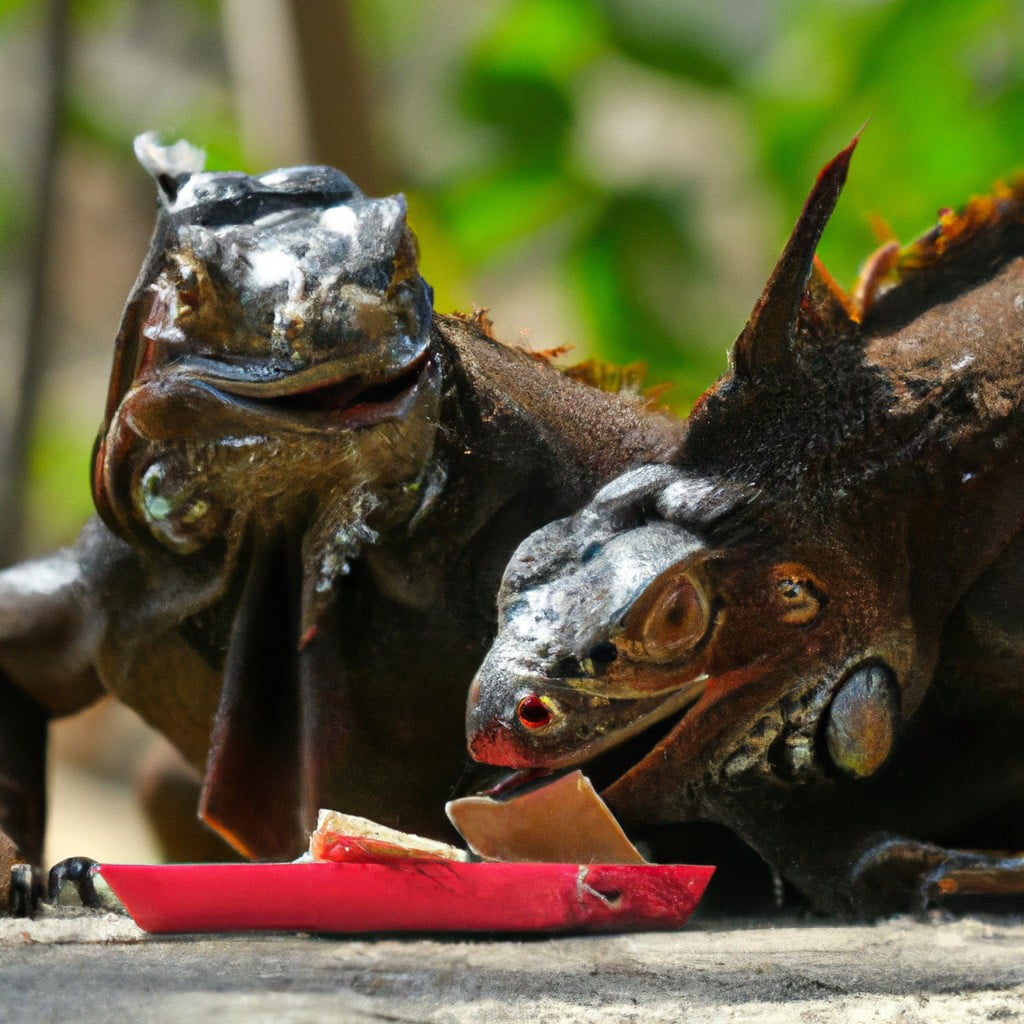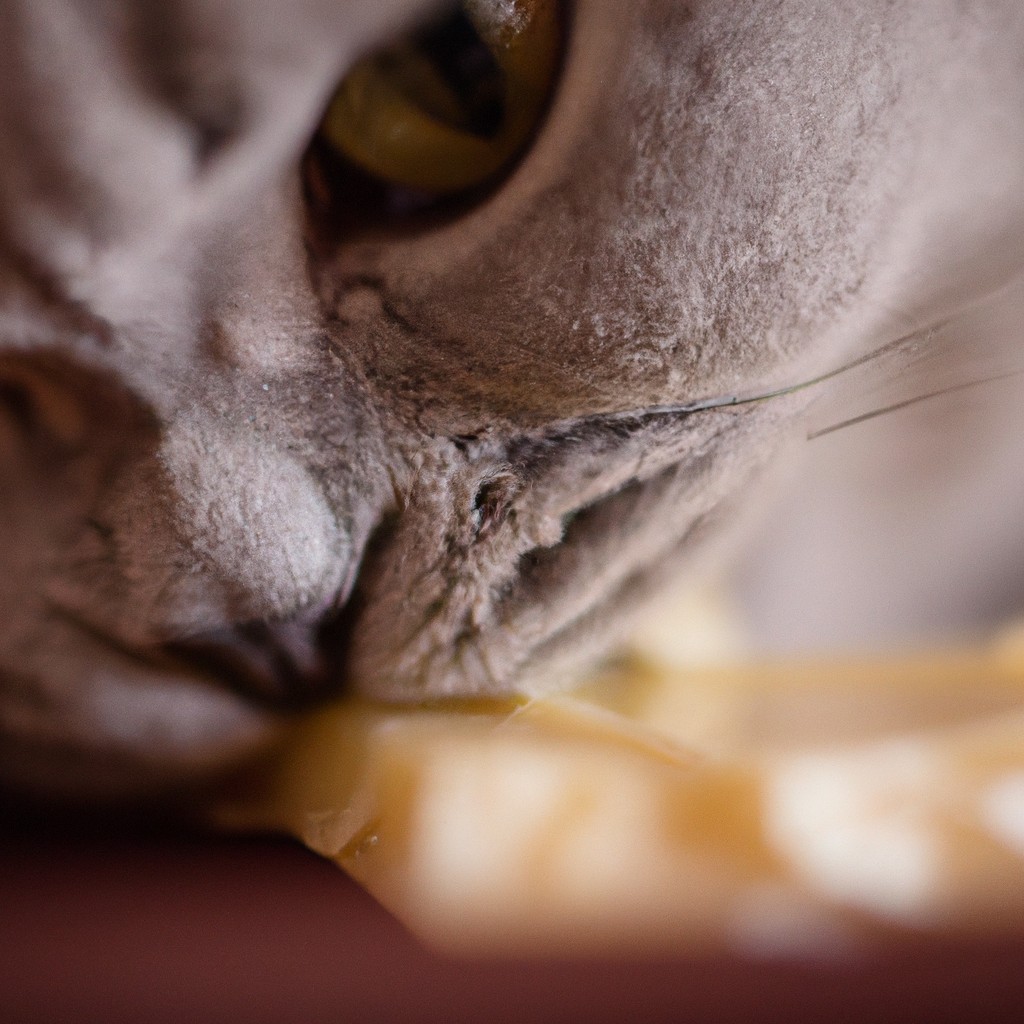No, iguanas cannot eat chocolate as it is toxic to them.
Contrary to popular belief, iguanas and chocolate are not a good match. Despite the irresistible taste of chocolate to humans, it’s important to understand that our scaly friends do not share the same dietary needs or tolerances.
In fact, chocolate can be harmful to iguanas, causing serious health problems or even proving fatal. In this article, a comprehensive explanation of why chocolate is detrimental to iguanas’ health will be provided, along with healthier alternatives to feed your pet iguana.
Key takeaways:
- Iguanas cannot eat chocolate, as it is toxic to them.
- Feeding iguanas chocolate can cause serious health problems or even death.
- Other toxic foods for iguanas include garlic, onion, leek, and dairy products.
- Iguanas should have a diverse, plant-based diet to avoid health hazards.
- Vitamin and mineral supplements are necessary for an iguana’s overall health.
Inside
Toxic Foods for Iguanas Including Chocolate

While it can be tempting to offer an iguana a bit of a sweet treat, certain foods can be highly toxic, including chocolate. The sugar, caffeine, and theobromine found in chocolate lead to life-threatening health conditions for iguanas.
Similarly, garlic, onion, and leek – all members of the Allium family – contain certain sulfur compounds that can trigger anemia in these reptiles.
Dairy products such as milk and cheese should also be avoided, as iguanas lack the enzyme to break down lactose properly. This can lead to digestive issues, including bloating and diarrhea.
Another group of foods to be cautious of are processed human foods, which often contain a higher amount of salts, sugars, and additives that aren’t safe for the reptilian digestive system.
Finally, certain fruits with high acidity like citrus fruits may disrupt the iguana’s gastric acid balance, causing discomfort and digestive problems. Err on the side of caution and stick to a diet approved by a reptile expert for the health of your iguana.
Hazards of Feeding Iguanas an Improper Diet
Feeding iguanas an improper diet can result in numerous health issues. One key hazard is Metabolic Bone Disease, caused by inadequate calcium intake. Premature death is often the consequence of consistently poor diet.
Impaction, a severe constipation type, is another health problem resulting from a protein-heavy diet or too much fruit, leading to intestinal blockage.
Kidney disease or failure can result from excessive animal-based proteins, which iguanas can’t process effectively as herbivores.
To avoid these hazards, a diverse, plant-based diet is essential, including leafy greens such as spinach and kale, as well as okra, cucumbers, and bell peppers. Calcium supplements can also be advantageous.
Remember, iguanas are not adapted to handle human food like chocolate or processed foods, which can cause rapid health deterioration. Consult with a professional herpetologist or a vet before introducing any new food to an iguana’s diet.
Safe and Unsafe Diet Items for Iguanas
Understanding the dietary needs of iguanas helps ensure their vitality, lifespan, and overall wellbeing. Iguanas are strictly herbivorous, their dietary regimen should predominantly consist of green leafy vegetables like collard greens, mustard greens, and dandelion greens. It’s also beneficial to include fresh fruits, such as strawberries, blueberries, and apples, for variety and additional nutritional value.
Despite gastronomical curiosity and appetite for experimentation in captivity, not all foods are safe for iguanas. They should be kept away from dairy products due to their inability to digest lactose. Ailments such as bloating, gas, and severe digestive discomfort can arise from dairy consumption.
Animal-derived proteins, such as meat or insects, should also be avoided. Iguanas lack the necessary enzymes to breakdown these types of proteins effectively, leading to kidney damage over time.
Most importantly, chocolate is a toxic food for iguanas. It contains theobromine and caffeine, both of which can cause serious illness in iguanas, or even result in death.
Ultimately, maintaining a diet that mimics an iguana’s natural diet in the wild will result in a healthier, happier pet.
The Role of Fresh and Frozen Vegetables in an Iguana’s Diet
Iguanas thrive on a diet that consists mostly of vegetables, both fresh and frozen. A variety of vegetables should form the cornerstone of your iguana’s diet, with the focus on nutritious options rich in vitamins, minerals, fiber, and moisture.
Safe vegetables for iguanas include bell peppers of all colors, cucumber, zucchini, and peas. Dark leafy greens, so nutritious, must be incorporated into your iguana’s diet. These include spinach, kale, and collard greens.
Frozen vegetables can be a good choice if fresh produce is not readily available. However, always ensure they are fully thawed and warmed to room temperature before feeding.
Carrots, broccoli, and celery are also favorable choices, but it’s advisable to serve these slightly cooked to enhance the digestive process.
Provide a colorful salad by mixing several types of vegetables. It stimulates your iguana’s appetite and ensures it gets a range of nutrients.
When feeding any new food to your iguana, observe its reaction carefully to ensure it’s not causing any digestive issues. If it shows signs of discomfort, cease feeding the particular item immediately.
While it’s essential the vegetables are thoroughly washed before serving, remember to chop them into manageable pieces. Iguanas generally prefer vegetables to fruits, thus providing a well-rounded vegetable feast can aid in maintaining a healthy, balanced diet. Avoid vegetables with high oxalic acid content such as spinach as they can hinder calcium absorption.
The use of vitamin and mineral supplements can counterbalance any potential deficiencies, but you are advised to seek the counsel of a qualified herpetologist or professional reptile dietary expert for any complex dietary concerns.
Iguanas’ Preferences for Fruits: Are Bananas, Apples, Oranges and Watermelons Safe?
Iguanas may enjoy a variety of fruits, offering both nutritional value and a delightful taste contrast to their staple diet of fresh and frozen veggies.
Bananas, because of their high content of potassium, are a nutritious choice. However, they should constitute no more than 10% of the iguana’s fruit intake due to their high sugar content.
Apples, rich in fiber and vitamin C, may be offered safely, but must be served peeled since apple skin might be too tough for iguanas.
Oranges can be given but sparingly, due to their high acidity which can disrupt an iguana’s digestive system. It is suggested to restrict citrus fruits like these to a small percentage of the diet.
Watermelons, with their high water content, could serve as a hydration booster for iguanas, but it’s crucial to remember that they offer marginal nutritional value beyond hydration and should not dominate the iguana’s fruit portion.
When incorporating these fruits into an iguana’s diet, remember to cut them into bite-sized pieces to prevent choking and facilitate better digestion. It’s essential to have moderation in mind while feeding fruits to iguanas. Diverse, balanced diets are optimal for their overall well-being.
Vitamin and Mineral Supplements in an Iguana’s Diet: Necessity and Benefits
Vitamin and mineral supplementation is essential for the overall health and well-being of your iguana.
These reptiles require a balanced diet, and supplements help fill nutritional gaps. While fresh fruits, vegetables, and foliage contribute substantial natural vitamins and minerals, they may still not provide completely balanced nutrition.
Particularly, Iguanas require calcium and vitamin D supplements. The lack of these could lead to metabolic bone disease, a condition characterized by weak and deformed bones.
Providing vitamin and mineral supplements can be approached in a variety of ways. Some of the more common practices include:
- Dusting food: This involves lightly coating the iguana’s food with a powdered supplement. It’s a simple method that ensures your pet gets the required nutrients.
- Gut loading: This includes feeding nutritious food to the prey items, which in turn are consumed by the iguana. While iguanas are primarily herbivores, this method can be used when feeding them insects on rare occasions.
- Soaking foods: Soak iguana’s food in liquid supplements. This method is ideal for liquid calcium or vitamin D supplements.
Remember that while supplements are beneficial, they should be used wisely. Over-supplementation can lead to toxicities. Always consult with a veterinarian to ensure proper diet management for your iguana.
The Importance of Adequate Hydration in Iguanas: Does Your Iguana Need Water?
An iguana requires a constant supply of fresh and clean water for optimal health. They can consume water in a variety of ways, including:
- Drinking it straight from their water dish, which should be regularly replenished to maintain its cleanliness and freshness
- Eating leafy green vegetables that are high in water content, such as lettuce and kale, which also serve to provide the necessary minerals and vitamins
- Absorbing it through their skin during baths, which also provides an enriching, enjoyable experience for these reptiles. Regular baths can stimulate the iguana’s hydration and digestion, and also maintain skin health
- Receiving it through rainfall or misting. This can be mimicked in a home environment with a spray bottle or automatic mister. For many iguanas, this is their preferred method of hydrating, as it closely replicates the conditions of their native habitat.
Dehydration in iguanas can lead to decreased appetite and lethargy. It is necessary to monitor your iguana’s behavior and physical condition to ensure adequate hydration, as well as seek veterinary consultation when in doubt.
FAQ
What can iguanas not eat?
Iguanas cannot consume meat, bugs, or excessive amounts of certain popular greens.
Do iguanas eat peanut butter?
Yes, iguanas can eat peanut butter, but it is not recommended as part of their regular diet.
What can green iguanas not eat?
Green iguanas should not eat crickets, mealworms of any kind, small mice, primate diets, trout chow, dog or cat food, or canned and frozen commercial iguana diets that might not be nutritionally balanced.
What is iguanas favorite food?
Iguanas primarily enjoy a diet of calcium-rich vegetables such as collard greens, beet greens, mustard greens, turnip greens, alfalfa hay, bok choy, kale, parsley, Swiss chard, romaine, kohlrabi, escarole, and dandelion.
Are there any adverse effects of feeding iguanas chocolate?
Yes, feeding chocolate to iguanas is dangerous as it is toxic to them and can lead to health problems or death.
Is there a safe amount of chocolate for an iguana to consume?
No, it is not safe for an iguana to consume any amount of chocolate due to theobromine, a substance that can be toxic to them.
Can alternative foods imitate the taste of chocolate for iguanas?
No, alternative foods cannot imitate the taste of chocolate for iguanas, because iguanas are herbivores and their taste receptors are unlikely to perceive chocolate flavor as humans do.




